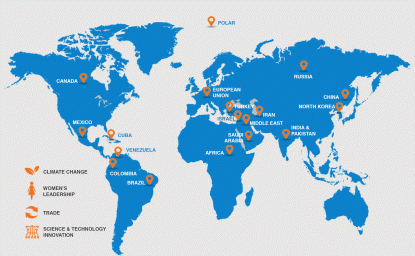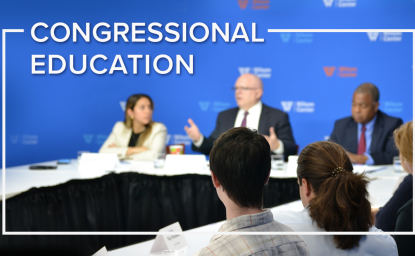The Latest
Q: What is the greatest challenge facing the United States’ regarding climate change?
A: The greatest challenge facing the new administration is balancing the country's immediate concerns with addressing the threats that climate change poses to our economy, our security, and our safety.
Climate change is larger and more complex than any other challenge that we face as a country. From storm surges, flooding, and wildfires, to heatwaves and drought, Americans are already suffering. Climate change will cause death, displacement, and disease, both within and outside the United States, and the past few years have proven that what happens in fragile states does not stay in fragile states. The U.S. military and intelligence community understand this and have made addressing climate change a top priority. Climate change is already interacting with economic and other factors to force people from their homes, and spurring violence and conflicts that threaten our national security. Fighting climate change is thus not just a moral imperative, it is a pragmatic strategy to protect our interests.
Q: What will the next president need to do to manage these obstacles and/or expectations?
A: The next president will need to manage domestic interests with international interests. Americans are concerned about our jobs and providing for our families. We are concerned about our health and long-term well-being. And we want to protect the United States’ leadership position and strategic interests around the world. All of these concerns are exacerbated by climate change, which threatens our economy, our national security, and our very existence. Regardless of the causes of climate change, the incoming administration will have to grapple with its effects, including more frequent and more severe natural disasters, growing instability in fragile states, and loss of lives and livelihoods. Internationally, other nations, including China and Saudi Arabia, have indicated that they will proceed with the last year’s landmark Paris agreement to reduce carbon emissions. If the new administration is reluctant to support the agreement, it will have to manage a potential backlash internationally. The Europeans, for example, might implement a carbon tax on U.S. products, and China may increase its influence on global climate governance, which may help to boost its global standing.
The United States has made strong commitments to fighting the climate challenge. President-elect Trump should continue to meet those commitments because it is in our national interest. He could protect American families and produce new jobs by funding adaptation and resilience efforts in vulnerable places, from the Sahel to Sarasota, from the Gulf of Guinea to the Gulf Coast. After this divisive election, the new administration could find common ground with the majority of Americans concerned about climate change by pledging to grow the green economy and make our world a safer, more secure home for all. Any attempts to weaken the EPA could potentially result in harsh criticism and blacklash from the public which the Administration will have to manage.
Q: What does this mean for climate resilience?
A: Climate change can also be a much needed source of growth for the American economy. We must build a resilient America – a prosperous and healthy America – through investments in clean energy, clean water, and clean air. We need long-lasting infrastructure that can withstand weather-related shocks, such as hurricanes and flooding, as well as slower threats like sea-level rise. We need to work with the private sector to prepare and plan for these changes and minimize the disruptions to our economy. And we need to deploy big data, sophisticated monitoring, and innovative technologies to safeguard our children and preserve our health.
Guest

Vice President, Sustainable Markets, Pact

Environmental Change and Security Program
The Environmental Change and Security Program (ECSP) explores the connections between environmental change, health, and population dynamics and their links to conflict, human insecurity, and foreign policy. Read more


China Environment Forum
China’s global footprint isn’t just an economic one, it’s an environmental one. From BRI investments in Africa and Asia to its growing presence in Latin America, understanding China’s motivations, who stands to gain - and who stands to lose - is critical to informing smart US foreign policy. Read more

Explore More
Browse Insights & Analysis
What Does the World Expect of President-elect Trump?

Can Climate-Resilient Agriculture Become an Engine for Syria’s Post-Conflict Recovery?

ECSP Weekly Watch | March 10 – 14



